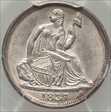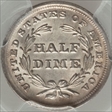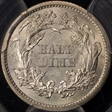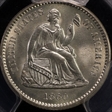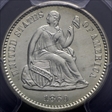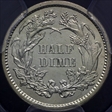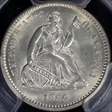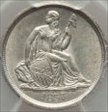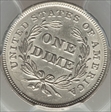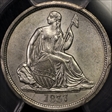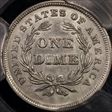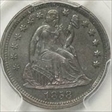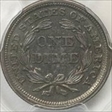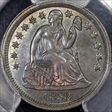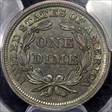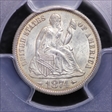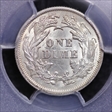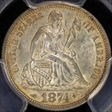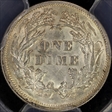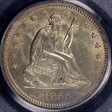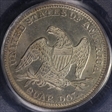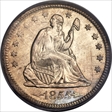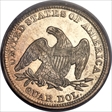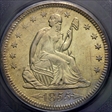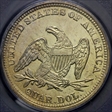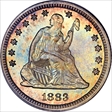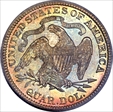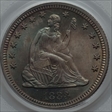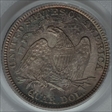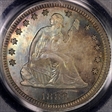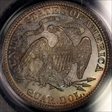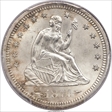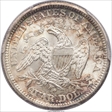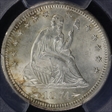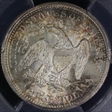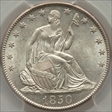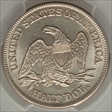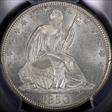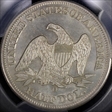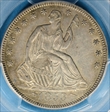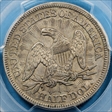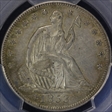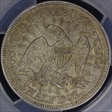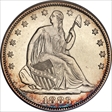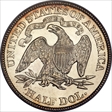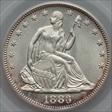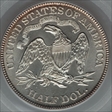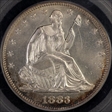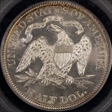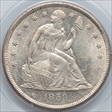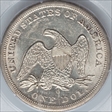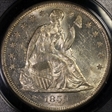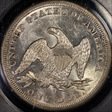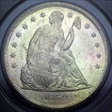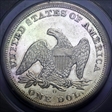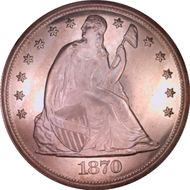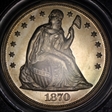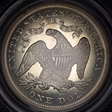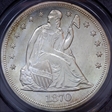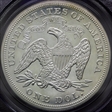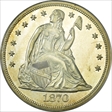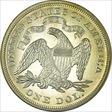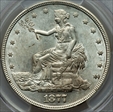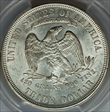The Kankakee Collection 的钱币相册
1837 10C No Stars, Large Date, F-101b, R.2, AU58 PCGS. Dual radial cracks on the lower obverse, and the absence of clash marks on the reverse, confirm the intermediate die state for the Large Date variety. A satiny stone-white representative that has an even strike and few marks.
1837 10C No Stars, Large Date, F-101b, R.2, AU58 PCGS. Dual radial cracks on the lower obverse, and the absence of clash marks on the reverse, confirm the intermediate die state for the Large Date variety. A satiny stone-white representative that has an even strike and few marks.
1837 10C No Stars, Large Date, F-101b, R.2, AU58 PCGS. Dual radial cracks on the lower obverse, and the absence of clash marks on the reverse, confirm the intermediate die state for the Large Date variety. A satiny stone-white representative that has an even strike and few marks.
1837 10C No Stars, Large Date, F-101b, R.2, AU58 PCGS. Dual radial cracks on the lower obverse, and the absence of clash marks on the reverse, confirm the intermediate die state for the Large Date variety. A satiny stone-white representative that has an even strike and few marks.
Briggs 1-A, showing a die break from the lower left rear of the arrow to the 1 in the date, and die scratches on the reverse above TAT and ME. A curious and interesting example of this type issue, struck from dies that appear to have been axially misaligned, creating a sharp strike at areas near the rims on each side and notable weakness in other peripheral areas. The weakest area of strike on the obverse is 9 to 12 o'clock, and on the reverse 6 to 9. Attractive sandy-gold luster with deeper rose color and a patch of pale blue complement the overall good eye appeal and decent preservation. Population: 18 in 64, 11 finer
Briggs 1-A, showing a die break from the lower left rear of the arrow to the 1 in the date, and die scratches on the reverse above TAT and ME. A curious and interesting example of this type issue, struck from dies that appear to have been axially misaligned, creating a sharp strike at areas near the rims on each side and notable weakness in other peripheral areas. The weakest area of strike on the obverse is 9 to 12 o'clock, and on the reverse 6 to 9. Attractive sandy-gold luster with deeper rose color and a patch of pale blue complement the overall good eye appeal and decent preservation. Population: 18 in 64, 11 finer
Briggs 1-A, showing a die break from the lower left rear of the arrow to the 1 in the date, and die scratches on the reverse above TAT and ME. A curious and interesting example of this type issue, struck from dies that appear to have been axially misaligned, creating a sharp strike at areas near the rims on each side and notable weakness in other peripheral areas. The weakest area of strike on the obverse is 9 to 12 o'clock, and on the reverse 6 to 9. Attractive sandy-gold luster with deeper rose color and a patch of pale blue complement the overall good eye appeal and decent preservation. Population: 18 in 64, 11 finer
Briggs 1-A, showing a die break from the lower left rear of the arrow to the 1 in the date, and die scratches on the reverse above TAT and ME. A curious and interesting example of this type issue, struck from dies that appear to have been axially misaligned, creating a sharp strike at areas near the rims on each side and notable weakness in other peripheral areas. The weakest area of strike on the obverse is 9 to 12 o'clock, and on the reverse 6 to 9. Attractive sandy-gold luster with deeper rose color and a patch of pale blue complement the overall good eye appeal and decent preservation. Population: 18 in 64, 11 finer
Briggs 1-A, showing a die break from the lower left rear of the arrow to the 1 in the date, and die scratches on the reverse above TAT and ME. A curious and interesting example of this type issue, struck from dies that appear to have been axially misaligned, creating a sharp strike at areas near the rims on each side and notable weakness in other peripheral areas. The weakest area of strike on the obverse is 9 to 12 o'clock, and on the reverse 6 to 9. Attractive sandy-gold luster with deeper rose color and a patch of pale blue complement the overall good eye appeal and decent preservation. Population: 18 in 64, 11 finer
Briggs 1-A, showing a die break from the lower left rear of the arrow to the 1 in the date, and die scratches on the reverse above TAT and ME. A curious and interesting example of this type issue, struck from dies that appear to have been axially misaligned, creating a sharp strike at areas near the rims on each side and notable weakness in other peripheral areas. The weakest area of strike on the obverse is 9 to 12 o'clock, and on the reverse 6 to 9. Attractive sandy-gold luster with deeper rose color and a patch of pale blue complement the overall good eye appeal and decent preservation. Population: 18 in 64, 11 finer
CAC. PCGS has seen 19 submissions in MS66 (one in MS66+) and three finer. This is among six in this grade with the CAC green bean.The stars on this lavishly patinated Premium Gem show full centers and radial lines. Definition is equally bold on Liberty's head, the eagle's wing feathers, claws, and arrow fletchings. Briggs 2a. Perhaps 800 total survive.
CAC. PCGS has seen 19 submissions in MS66 (one in MS66+) and three finer. This is among six in this grade with the CAC green bean.The stars on this lavishly patinated Premium Gem show full centers and radial lines. Definition is equally bold on Liberty's head, the eagle's wing feathers, claws, and arrow fletchings. Briggs 2a. Perhaps 800 total survive.
CAC. PCGS has seen 19 submissions in MS66 (one in MS66+) and three finer. This is among six in this grade with the CAC green bean.The stars on this lavishly patinated Premium Gem show full centers and radial lines. Definition is equally bold on Liberty's head, the eagle's wing feathers, claws, and arrow fletchings. Briggs 2a. Perhaps 800 total survive.
CAC. PCGS has seen 19 submissions in MS66 (one in MS66+) and three finer. This is among six in this grade with the CAC green bean.The stars on this lavishly patinated Premium Gem show full centers and radial lines. Definition is equally bold on Liberty's head, the eagle's wing feathers, claws, and arrow fletchings. Briggs 2a. Perhaps 800 total survive.
CAC. PCGS has seen 19 submissions in MS66 (one in MS66+) and three finer. This is among six in this grade with the CAC green bean.The stars on this lavishly patinated Premium Gem show full centers and radial lines. Definition is equally bold on Liberty's head, the eagle's wing feathers, claws, and arrow fletchings. Briggs 2a. Perhaps 800 total survive.
CAC. PCGS has seen 19 submissions in MS66 (one in MS66+) and three finer. This is among six in this grade with the CAC green bean.The stars on this lavishly patinated Premium Gem show full centers and radial lines. Definition is equally bold on Liberty's head, the eagle's wing feathers, claws, and arrow fletchings. Briggs 2a. Perhaps 800 total survive.
Briggs 1-A. Forest-green and tobacco-brown toning accompanies the borders, while the fields and motifs are principally brilliant. A crisply struck, frosty, and thoroughly lustrous Premium Gem that boasts superior eye appeal. PCGS reports just five numerically finer examples. Population: 36 in 66 (2 in 66+), 5 finer
Briggs 1-A. Forest-green and tobacco-brown toning accompanies the borders, while the fields and motifs are principally brilliant. A crisply struck, frosty, and thoroughly lustrous Premium Gem that boasts superior eye appeal. PCGS reports just five numerically finer examples. Population: 36 in 66 (2 in 66+), 5 finer
Briggs 1-A. Forest-green and tobacco-brown toning accompanies the borders, while the fields and motifs are principally brilliant. A crisply struck, frosty, and thoroughly lustrous Premium Gem that boasts superior eye appeal. PCGS reports just five numerically finer examples. Population: 36 in 66 (2 in 66+), 5 finer
Briggs 1-A. Forest-green and tobacco-brown toning accompanies the borders, while the fields and motifs are principally brilliant. A crisply struck, frosty, and thoroughly lustrous Premium Gem that boasts superior eye appeal. PCGS reports just five numerically finer examples. Population: 36 in 66 (2 in 66+), 5 finer
This Select 1850-O half is largely untoned and frosty, showing abundant luster amid a few small scrapes. A scarce variety, with doubling on the upper vertical obverse shield lines and shield edge. Two knocks on Liberty's knees are the only mentionable marks, making this an appealing and well-struck candidate for a type, date, or variety set.
This Select 1850-O half is largely untoned and frosty, showing abundant luster amid a few small scrapes. A scarce variety, with doubling on the upper vertical obverse shield lines and shield edge. Two knocks on Liberty's knees are the only mentionable marks, making this an appealing and well-struck candidate for a type, date, or variety set.
This Select 1850-O half is largely untoned and frosty, showing abundant luster amid a few small scrapes. A scarce variety, with doubling on the upper vertical obverse shield lines and shield edge. Two knocks on Liberty's knees are the only mentionable marks, making this an appealing and well-struck candidate for a type, date, or variety set.
This Select 1850-O half is largely untoned and frosty, showing abundant luster amid a few small scrapes. A scarce variety, with doubling on the upper vertical obverse shield lines and shield edge. Two knocks on Liberty's knees are the only mentionable marks, making this an appealing and well-struck candidate for a type, date, or variety set.
Only 8000 struck,perhaps 200 Unc. survive. 31 finer. Brilliant aside from delicate wisps of golden-russet toning at the borders, this frosty near-Gem is irregularly struck with needle-sharp centers and a hint of softness at the upper obverse and corresponding area on the reverse
Only 8000 struck,perhaps 200 Unc. survive. 31 finer. Brilliant aside from delicate wisps of golden-russet toning at the borders, this frosty near-Gem is irregularly struck with needle-sharp centers and a hint of softness at the upper obverse and corresponding area on the reverse
Only 8000 struck,perhaps 200 Unc. survive. 31 finer. Brilliant aside from delicate wisps of golden-russet toning at the borders, this frosty near-Gem is irregularly struck with needle-sharp centers and a hint of softness at the upper obverse and corresponding area on the reverse
Only 8000 struck,perhaps 200 Unc. survive. 31 finer. Brilliant aside from delicate wisps of golden-russet toning at the borders, this frosty near-Gem is irregularly struck with needle-sharp centers and a hint of softness at the upper obverse and corresponding area on the reverse
Only 8000 struck,perhaps 200 Unc. survive. 31 finer. Brilliant aside from delicate wisps of golden-russet toning at the borders, this frosty near-Gem is irregularly struck with needle-sharp centers and a hint of softness at the upper obverse and corresponding area on the reverse
Only 8000 struck,perhaps 200 Unc. survive. 31 finer. Brilliant aside from delicate wisps of golden-russet toning at the borders, this frosty near-Gem is irregularly struck with needle-sharp centers and a hint of softness at the upper obverse and corresponding area on the reverse
1859-O $1 MS60 PCGS. An undeniably Mint State example, this 1859-O Seated Liberty dollar displays fresh, frosty devices set against mirrored fields that show just a touch of light golden toning. Well-struck, with scattered abrasions pursuant to the grade. Housed in a first generation holder.One or more bags of 1859-O and 1860-O Seated silver dollars remained in Treasury vaults until they were released a little over 50 years ago. Today, most low level Mint State examples of these two issues are from that source. This brilliant silver example is likely one of those coins, featuring reflective fields and scattered grade-consistent surface marks
1859-O $1 MS60 PCGS. An undeniably Mint State example, this 1859-O Seated Liberty dollar displays fresh, frosty devices set against mirrored fields that show just a touch of light golden toning. Well-struck, with scattered abrasions pursuant to the grade. Housed in a first generation holder.One or more bags of 1859-O and 1860-O Seated silver dollars remained in Treasury vaults until they were released a little over 50 years ago. Today, most low level Mint State examples of these two issues are from that source. This brilliant silver example is likely one of those coins, featuring reflective fields and scattered grade-consistent surface marks
1859-O $1 MS60 PCGS. An undeniably Mint State example, this 1859-O Seated Liberty dollar displays fresh, frosty devices set against mirrored fields that show just a touch of light golden toning. Well-struck, with scattered abrasions pursuant to the grade. Housed in a first generation holder.One or more bags of 1859-O and 1860-O Seated silver dollars remained in Treasury vaults until they were released a little over 50 years ago. Today, most low level Mint State examples of these two issues are from that source. This brilliant silver example is likely one of those coins, featuring reflective fields and scattered grade-consistent surface marks
1859-O $1 MS60 PCGS. An undeniably Mint State example, this 1859-O Seated Liberty dollar displays fresh, frosty devices set against mirrored fields that show just a touch of light golden toning. Well-struck, with scattered abrasions pursuant to the grade. Housed in a first generation holder.One or more bags of 1859-O and 1860-O Seated silver dollars remained in Treasury vaults until they were released a little over 50 years ago. Today, most low level Mint State examples of these two issues are from that source. This brilliant silver example is likely one of those coins, featuring reflective fields and scattered grade-consistent surface marks
1859-O $1 MS60 PCGS. An undeniably Mint State example, this 1859-O Seated Liberty dollar displays fresh, frosty devices set against mirrored fields that show just a touch of light golden toning. Well-struck, with scattered abrasions pursuant to the grade. Housed in a first generation holder.One or more bags of 1859-O and 1860-O Seated silver dollars remained in Treasury vaults until they were released a little over 50 years ago. Today, most low level Mint State examples of these two issues are from that source. This brilliant silver example is likely one of those coins, featuring reflective fields and scattered grade-consistent surface marks
1859-O $1 MS60 PCGS. An undeniably Mint State example, this 1859-O Seated Liberty dollar displays fresh, frosty devices set against mirrored fields that show just a touch of light golden toning. Well-struck, with scattered abrasions pursuant to the grade. Housed in a first generation holder.One or more bags of 1859-O and 1860-O Seated silver dollars remained in Treasury vaults until they were released a little over 50 years ago. Today, most low level Mint State examples of these two issues are from that source. This brilliant silver example is likely one of those coins, featuring reflective fields and scattered grade-consistent surface marks
Pale champagne iridescence complements the frosty motifs and glittering mirror fields. Boldly struck virtually everywhere save for a touch of softness at the eagle's dexter shin. Only 1,000 proof dollars were struck during the year, and only15 finer exist with the PCGS Cameo designation.
Pale champagne iridescence complements the frosty motifs and glittering mirror fields. Boldly struck virtually everywhere save for a touch of softness at the eagle's dexter shin. Only 1,000 proof dollars were struck during the year, and only15 finer exist with the PCGS Cameo designation.
Pale champagne iridescence complements the frosty motifs and glittering mirror fields. Boldly struck virtually everywhere save for a touch of softness at the eagle's dexter shin. Only 1,000 proof dollars were struck during the year, and only15 finer exist with the PCGS Cameo designation.
Pale champagne iridescence complements the frosty motifs and glittering mirror fields. Boldly struck virtually everywhere save for a touch of softness at the eagle's dexter shin. Only 1,000 proof dollars were struck during the year, and only15 finer exist with the PCGS Cameo designation.
Pale champagne iridescence complements the frosty motifs and glittering mirror fields. Boldly struck virtually everywhere save for a touch of softness at the eagle's dexter shin. Only 1,000 proof dollars were struck during the year, and only15 finer exist with the PCGS Cameo designation.
Pale champagne iridescence complements the frosty motifs and glittering mirror fields. Boldly struck virtually everywhere save for a touch of softness at the eagle's dexter shin. Only 1,000 proof dollars were struck during the year, and only15 finer exist with the PCGS Cameo designation.
Pale champagne iridescence complements the frosty motifs and glittering mirror fields. Boldly struck virtually everywhere save for a touch of softness at the eagle's dexter shin. Only 1,000 proof dollars were struck during the year, and only15 finer exist with the PCGS Cameo designation.




















